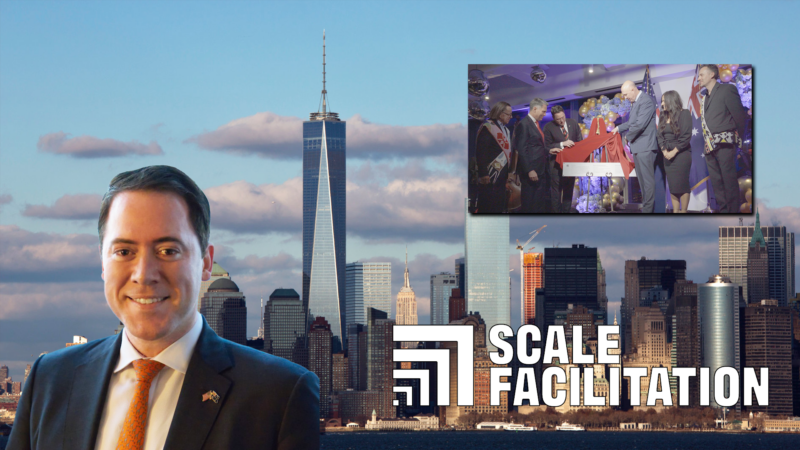An ex-PwC partner’s lithium battery startup pulled a top flight crowd from both sides of Australia politics to its grand Manhattan opening. But it’s not all bubbles and banter for staff at Scale Facilitation, writes Sean Johnson
Something about the company, Scale Facilitation, seemed just too too good to be true. Here was this Geelong start-up, with dreams of supplying lithium batteries for electric vehicles across the globe, renting space on the 82nd floor of One World Trade Center in Manhattan — the US’s tallest building — and flying Peter Dutton to New York for its opening.
And Dutton wasn’t alone. Deputy Prime Minister and Defence Minister Richard Marles, who was in the United States for Australia–US Ministerial Consultations (AUSMIN) in Washington, was on hand at December ribbon cutting to declare the company’s CEO and founder, David A.Collard, a “force of nature…innately entrepreneurial…values driven”.
Collard himself was ebullient: “It was an immense honour to have both Richard Marles and Peter Dutton here to help us open our new office at One World Trade Center. We believe our work will lead to a productive bilateral and bipartisan unity… and the flourishing of U.S. and Australia as close trading partners.”
One of PwC’s brightest
Marles’ electorate covers Avalon where Recharge Industries, a Scale subsidiary, is promising to build a battery ‘gigafactory’. So, why wouldn’t he and the Opposition leader give the Geelong-educated Collard, once the youngest partner at PwC partner, a morale boost, especially one with green-tinged ambitions across Australia, the UK and the US?
But how could a small company established in 2019 with little track record, apart from flogging facemasks during the pandemic (how hard would that be?), afford to lease the entire floor of One World Trade Center, built on the site of the Twin Towers, and pay for Dutton to visit its glitzy Big Apple HQ?
Well, it seems they couldn’t. At least not without some people missing out down the line. As The Australian reported last month, Scale was behind in its payments to Australian staff, contractors and suppliers, and in arrears on the North Geelong office lease.
Sources say Collard is confident that every dollar invested by Scale will be recouped from the Federal government, though exactly how is unclear. Perhaps that’s why it’s handy to have Dutton and Marles at your opening drinkies.
The company appears dogged by payment issues. More on that in a moment.
Company raided by AFP, ATO
On June 24, just over a week after the nonpayment to Australian staff came to light, Australian Federal Police and Australian Tax Office officers from the Serious Financial Crime Taskforce raided the Scale Facilitation’s North Geelong offices over an “alleged taxation fraud” at SaniteX.
SaniteX is a Scale subsidiary that sells personal protective equipment and provides services to other Scale companies. It shares the North Geelong facilities with Scale.
While the details of the allegations are not yet known, the taskforce’s four areas of focus are offshore tax evasion, illegal phoenix activity, cybercrime involving tax and superannuation, and ATO-administered COVID-19 stimulus measures. The taskforce website says it looks at the “most serious and complex forms of financial crime.”
At the time of the raid, a spokesman for Scale Facilitation said in a statement: “We have and will continue to fully cooperate with the Australian Taxation Office and now the AFP. We deny any wrongdoing and will continue working with our legal and other advisers to defend any matters arising from these discussions.”
Dogged by pay delays
Meanwhile, the company can’t seem to shake cashflow issues which have seen delays in staff being paid and payments coming from unusual sources. These issues are believed to behind several recent senior staff departures.
The delays began soon after Scale inked a deal to take over collapsed UK battery company Britishvolt in February. (Britishvolt also received high-profile political backing, from the PM Boris Johnson, but collapsed when it failed to gain sufficient investment for its own ‘gigafactory’.)
Not long after the Britishvolt deal, Scale staff in the US didn’t receive their fortnightly pay.
An HR email to staff, which Open Politics has seen, blamed the problem on a “technical issue” and said it was “anticipated” payments would be made the next day.
The following month the issue seemed to be fixed only to re-appear in April. An email to US staff in mid-April from Collard apologised for “any issues or stress this has caused” and blamed a “cut off issue”. He assured staff that all had been resolved and that their pay would be processed in a few days.
But the problem wasn’t resolved for long. In late May, Collard again apologised to staff for further delays and provided three new excuses: transaction costs associated with buying Britishvolt, $50 million in late receivables, and cash ‘trapped’ in India.
All would soon be fixed, Collard said. Funds were arriving from the UK and would be “rolled out across the US team in coming days.”
Staff were paid soon after. But not from their normal payroll provider, TriNet.
Enter the Don
Payments came from the personal account of a low profile colleague, Don Kingston, Scale’s former managing director (enterprise risk), based in Washington D.C. The US military veteran was also director of strategy and research at SaniteX, the Scale company being investigated by the ATO’s Serious Financial Crime Taskforce.
Neither Open Politics or MWM suggests there is any connection between Kingston and whatever allegations the taskforce is investigating at SaniteX.
Unfortunately for staff and their families, Kingston’s time as a benefactor was short lived. Payments stopped after he departed in June along with several senior managers and almost the entire legal team.
Staff were also paid for a time by 3C USA LLC, a limited liability company that hardly anyone on the US staff had heard of. It trades under the name SaniteX Global. Kingston is the registered agent for 3C USA.
What to make of all this?
Business and finance types we’ve spoken to say the unorthodox payment methods, while not illegal, point to other potential issues: have Scale’s bank accounts been frozen by a court order because of unpaid debts or taxes? If that’s the case, how is Scale getting the money to pay wages?
There are also questions about whether the company is complying with its tax and insurance obligations as staff did not receive payroll documentation with fund transfers from Kingston and 3C USA.
None of this augurs well for the company and its “innately entrepreneurial” boss. But he seems undaunted.
Collard upbeat
Despite Scale’s cash flow difficulties, tax probe, and shrinking workforce, Open Politics understands that Collard has taken out a multi-year lease on the 88th floor at One World Trade Center even though the 82nd floor is relatively empty. He has sought to justify the move by saying the first-year was free of charge.
Sources say Collard is confident that every dollar invested by Scale will be recouped from the Federal government, though exactly how is unclear. Perhaps that’s why it’s handy to have Dutton and Marles at your opening drinkies.
Being a start-up is no easy adventure. But Scale Facilitation seems to be facing considerable headwinds in realising its global ambitions — many of its own making.
Open Politics contacted Collard for comment but he did not respond before publication.
Sean Johnson is the founder of political transparency website Open Politics and a former federal ministerial adviser and public affairs consultant.

